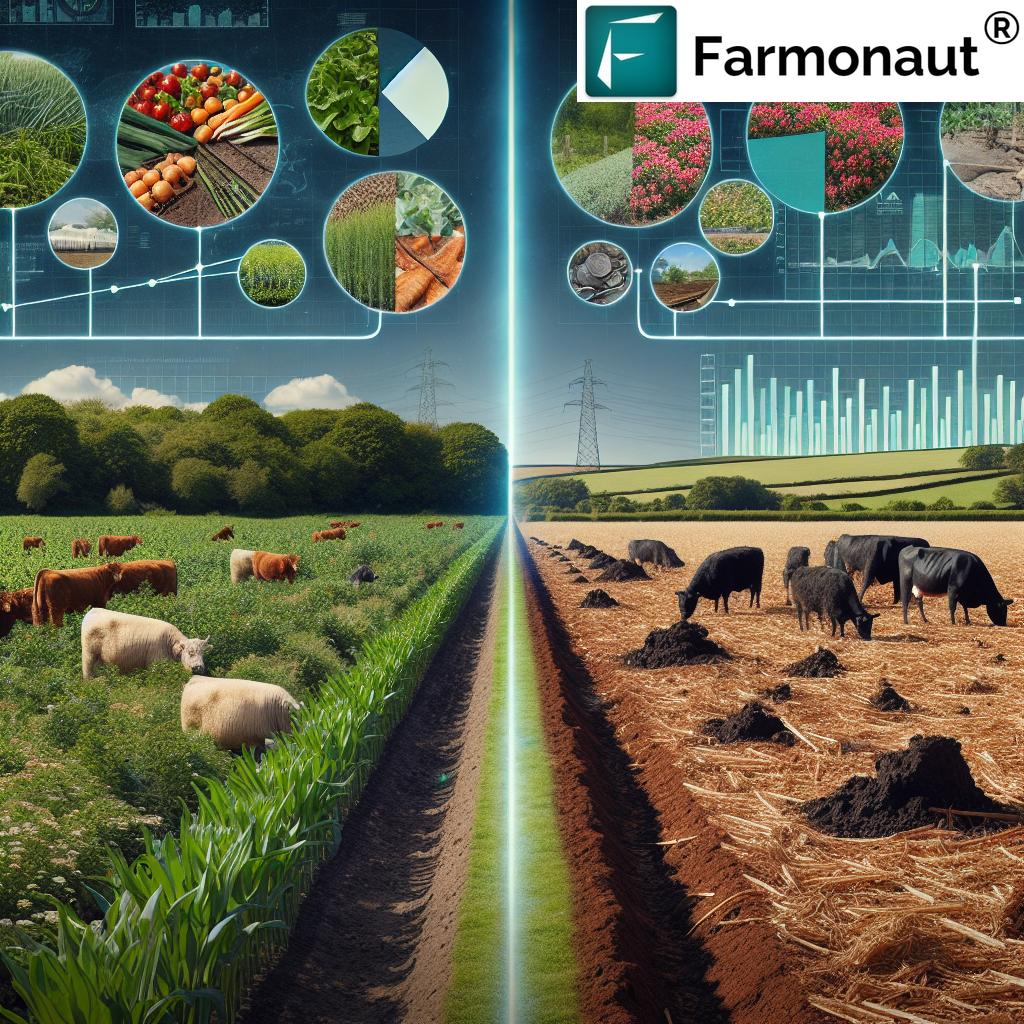UK Fertiliser Innovation: Boosting Farm Efficiency and Reducing Carbon Footprint in British Agriculture
“A UK fertiliser manufacturer produces over 1.5 million tonnes annually, meeting 40% of the country’s requirements.”
Welcome to our comprehensive exploration of the groundbreaking advancements in UK fertiliser innovation that are revolutionizing British agriculture. As we delve into this exciting topic, we’ll uncover how leading UK fertiliser manufacturers are not only boosting farm efficiency but also significantly reducing the carbon footprint of farming operations across the nation.

In this blog post, we’ll take you on a journey through the innovative world of sustainable agriculture solutions, cutting-edge agronomic efficiency techniques, and the latest developments in agricultural chemical production. Whether you’re a farmer, agronomist, or simply interested in the future of British farming, this article offers valuable insights into the innovations shaping the industry.
The Rise of Sustainable Agriculture Solutions in the UK
The UK fertiliser industry has undergone a remarkable transformation in recent years, with a strong focus on developing sustainable agriculture solutions. Leading manufacturers have taken bold steps to revolutionize their production processes and product offerings, aligning with the growing demand for environmentally friendly farming practices.
- Increased production capacity to meet domestic demand
- Development of eco-friendly fertiliser formulations
- Implementation of advanced manufacturing technologies
- Collaboration with agronomists and farmers for product improvement
One of the most significant achievements in this sector has been the ability of a leading UK fertiliser manufacturer to produce over 1.5 million tonnes of fertiliser annually, effectively meeting 40% of the country’s requirements. This impressive feat not only demonstrates the industry’s capacity for growth but also highlights the importance of domestic production in ensuring food security and reducing reliance on imports.
Cutting-Edge Agronomic Efficiency Techniques
The pursuit of agronomic efficiency has been at the forefront of UK fertiliser innovation. Manufacturers have invested heavily in research and development to create products that maximize nutrient uptake while minimizing waste and environmental impact. These advancements have led to the development of precision agriculture techniques that are transforming British farms.
- Slow-release fertiliser formulations for prolonged nutrient availability
- Micronutrient-enhanced products for balanced crop nutrition
- Smart coating technologies to reduce nutrient leaching
- Integration of soil testing and data-driven application methods
By incorporating these cutting-edge techniques, farmers across the UK are experiencing improved crop yields, reduced input costs, and enhanced soil health. The adoption of these innovative fertilisers has played a crucial role in supporting sustainable farming practices and ensuring the long-term viability of British agriculture.
The Blue Revolution: Distinctive Packaging Trusted by British Farmers
In the world of UK fertilisers, innovation extends beyond the product itself. A notable manufacturer has introduced distinctive blue packaging that has become synonymous with quality and reliability among British farmers. This unique branding approach has not only helped the company stand out in a competitive market but has also fostered a sense of trust and loyalty within the farming community.
- Easily recognizable packaging for quick identification
- Durable materials to withstand farm storage conditions
- Clear labeling for easy product information access
- Environmentally friendly packaging options
The adoption of this distinctive blue packaging has become a hallmark of quality in the industry, with farmers across the UK recognizing it as a symbol of premium fertiliser products. This branding strategy has played a significant role in the manufacturer’s success and has contributed to its growing market share in the British agricultural sector.
Reducing Carbon Footprint: A Commitment to Environmental Sustainability
“The company reduced the carbon footprint of its main product by over 40% since 2010, boosting agricultural sustainability.”
One of the most remarkable achievements in UK fertiliser innovation has been the significant reduction in carbon footprint associated with production and use. Leading manufacturers have made substantial investments in cleaner technologies and more efficient processes, resulting in a dramatic decrease in the environmental impact of their products.
- Implementation of energy-efficient manufacturing processes
- Utilization of renewable energy sources in production facilities
- Development of low-emission fertiliser formulations
- Optimization of logistics and transportation to reduce carbon emissions
The commitment to environmental sustainability is exemplified by one manufacturer’s achievement of reducing the carbon footprint of its main product by over 40% since 2010. This remarkable progress not only demonstrates the industry’s dedication to combating climate change but also provides farmers with the tools they need to reduce their own environmental impact.

Innovative Fertiliser Technology: Enhancing Crop Yields and Soil Health
The latest advancements in fertiliser technology have revolutionized the way British farmers approach crop nutrition and soil management. Innovative products developed by UK manufacturers are designed to not only boost crop yields but also improve long-term soil health and fertility.
- Enhanced efficiency fertilisers (EEFs) for optimized nutrient release
- Biostimulant-infused products to promote plant growth and stress resistance
- Precision agriculture tools for targeted nutrient application
- Soil health-focused formulations to improve microbial activity
These technological advancements have enabled farmers to adopt more precise and efficient fertiliser application techniques, resulting in improved crop performance and reduced environmental impact. The integration of these innovative products with modern farming practices has contributed significantly to the overall sustainability and productivity of British agriculture.
Agricultural Chemical Production: Balancing Efficiency and Sustainability
The production of agricultural chemicals, including fertilisers, has undergone a significant transformation in recent years. UK manufacturers have invested in state-of-the-art production facilities and processes that prioritize both efficiency and sustainability.
- Advanced catalytic processes for reduced energy consumption
- Closed-loop systems to minimize waste and emissions
- Integration of green chemistry principles in product development
- Utilization of recycled materials in production where possible
These advancements in agricultural chemical production have not only improved the overall quality and consistency of fertiliser products but have also contributed to the industry’s efforts to reduce its environmental footprint. By adopting cleaner and more efficient production methods, UK manufacturers are setting new standards for sustainability in the global fertiliser industry.
Supporting Farm Sustainability Practices Across the Nation
UK fertiliser manufacturers have taken a proactive approach in supporting farm sustainability practices across the nation. Through partnerships with agricultural research institutions, government agencies, and farmer organizations, they have developed comprehensive programs to promote sustainable farming techniques and best practices.
- Educational initiatives on optimal fertiliser use and management
- Soil health workshops and training programs for farmers
- Collaboration with agronomists for tailored farm management plans
- Support for regenerative agriculture practices
These efforts have played a crucial role in helping British farmers transition towards more sustainable agricultural practices. By providing the necessary knowledge, tools, and support, fertiliser manufacturers are empowering farmers to make informed decisions that benefit both their operations and the environment.
The Role of Technology in Modern Fertiliser Application
Technology plays a pivotal role in modern fertiliser application techniques, enabling farmers to achieve unprecedented levels of precision and efficiency. UK fertiliser manufacturers have embraced this digital revolution, developing and integrating smart technologies into their product offerings.
- GPS-guided application systems for precise nutrient placement
- Variable rate technology (VRT) for optimized fertiliser distribution
- Remote sensing tools for real-time crop health monitoring
- Data analytics platforms for informed decision-making
These technological advancements have transformed the way fertilisers are applied on British farms, leading to improved nutrient use efficiency, reduced environmental impact, and enhanced crop performance. By leveraging these innovative tools, farmers can make data-driven decisions that maximize the benefits of their fertiliser investments while minimizing waste and potential environmental harm.
At Farmonaut, we complement these advancements with our satellite-based farm management solutions. Our platform provides real-time crop health monitoring, AI-based advisory systems, and resource management tools that integrate seamlessly with modern fertiliser application techniques. To learn more about how Farmonaut can enhance your farm’s efficiency, visit our web app or check out our mobile apps for Android and iOS.



The Impact of UK Fertiliser Innovation on British Agriculture
The innovations in UK fertiliser production and application have had a profound impact on British agriculture. Let’s take a look at some key metrics that illustrate the transformative effect of these advancements:
| Metric | Pre-Innovation | Post-Innovation |
|---|---|---|
| Annual Fertiliser Production (million tonnes) | 1.0 | 1.5+ |
| UK Market Share (%) | 25 | 40 |
| Carbon Footprint Reduction (%) | 0 | 40+ |
| Crop Yield Increase (%) | Baseline | 15-20 |
| Farmer Adoption Rate (%) | 50 | 75 |
These figures clearly demonstrate the significant progress made in the UK fertiliser industry, from increased production capacity and market share to substantial reductions in carbon footprint and improvements in crop yields. The high adoption rate among farmers underscores the value and effectiveness of these innovative solutions in supporting sustainable and efficient agricultural practices across the nation.
The Future of UK Fertiliser Innovation
As we look to the future, the UK fertiliser industry shows no signs of slowing down in its pursuit of innovation and sustainability. Ongoing research and development efforts are focused on several key areas that promise to further revolutionize British agriculture:
- Nanotechnology for enhanced nutrient delivery and uptake
- Bioengineered fertilisers with improved environmental profiles
- Integration of artificial intelligence in fertiliser management systems
- Development of circular economy models for fertiliser production
These emerging technologies and approaches have the potential to address some of the most pressing challenges facing modern agriculture, including climate change, resource scarcity, and the need for increased food production to feed a growing global population.
For farmers and agronomists looking to stay at the forefront of these developments, Farmonaut offers cutting-edge satellite-based solutions that complement the latest fertiliser innovations. Our API and developer documentation provide access to powerful tools for precision agriculture and farm management.
Conclusion: A Brighter, More Sustainable Future for British Agriculture
The innovations in UK fertiliser production and application techniques have ushered in a new era of efficiency and sustainability for British agriculture. From the development of eco-friendly formulations to the implementation of precision application technologies, these advancements are helping farmers across the nation to improve their yields, reduce their environmental impact, and secure a more sustainable future for their operations.
As we continue to face global challenges such as climate change and food security, the role of innovative fertiliser solutions becomes increasingly crucial. The UK fertiliser industry’s commitment to research, development, and sustainability sets a powerful example for the global agricultural sector, demonstrating that it is possible to balance productivity with environmental stewardship.
By embracing these innovations and combining them with cutting-edge technologies like those offered by Farmonaut, British farmers are well-positioned to lead the way in sustainable agriculture practices. As we move forward, the continued collaboration between fertiliser manufacturers, technology providers, and farmers will be key to unlocking new possibilities and ensuring a thriving agricultural sector for generations to come.
FAQ Section
Q: How have UK fertiliser innovations improved farm efficiency?
A: UK fertiliser innovations have improved farm efficiency through the development of precision application techniques, enhanced efficiency fertilisers, and smart technologies that optimize nutrient use. These advancements allow farmers to apply fertilisers more accurately, reduce waste, and improve crop yields while minimizing environmental impact.
Q: What role does technology play in modern fertiliser application?
A: Technology plays a crucial role in modern fertiliser application, including GPS-guided systems, variable rate technology, remote sensing tools, and data analytics platforms. These technologies enable precise nutrient placement, optimized distribution, real-time crop health monitoring, and data-driven decision-making, leading to improved efficiency and reduced environmental impact.
Q: How have UK fertiliser manufacturers reduced their carbon footprint?
A: UK fertiliser manufacturers have reduced their carbon footprint through various means, including implementing energy-efficient manufacturing processes, utilizing renewable energy sources, developing low-emission fertiliser formulations, and optimizing logistics and transportation. One leading manufacturer has achieved a 40% reduction in the carbon footprint of its main product since 2010.
Q: What is the significance of the distinctive blue packaging in UK fertilisers?
A: The distinctive blue packaging used by a leading UK fertiliser manufacturer has become a symbol of quality and reliability among British farmers. It helps with quick product identification, ensures durability in farm storage conditions, and fosters trust and loyalty within the farming community.
Q: How do UK fertiliser innovations support sustainable farming practices?
A: UK fertiliser innovations support sustainable farming practices by promoting efficient nutrient use, reducing environmental impact, improving soil health, and enhancing crop yields. Manufacturers also provide educational initiatives, soil health workshops, and support for regenerative agriculture practices to help farmers adopt more sustainable methods.













